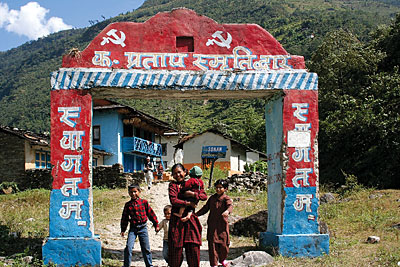 WIKIMEDIA COMMONS |
The end of the 34-year rule of the Communist Party of India Marxist CPI(M) in West Bengal and the defeat of the left coalition in Kerala in state elections this week have once again stirred a debate on the future of the left movement in the region. Liberals see the defeat as a result of people's disillusionment with the populist programs of the left while socialists blame corruption and ideological bankruptcy in the CPI(M) for the defeat.
The countdown to the rout of the communists in West Bengal had begun in 2007, after the Buddhadeb Bhattacharya government unleashed a brutal crackdown against farmers in Nandigram protesting government's forced acquisition of land to set up a chemical plant. In 2008, the CPI (M) government once again used the colonial-era Land Acquisition Act of 1894 to displace thousands of peasants from fertile farms to set up a TATA Nano car factory in Singur district. The party lost its credibility and was trounced in local elections in 2008.
In spite of being a socialist government, the CPI(M) regime was accused of compromising on fundamentals of social justice. The party's dual policy of flaunting a democratic face in the national politics while suppressing democratic dissent within the state maligned the image of the left. A party, which took a moral position on issues like farmers' suicides and faked police encounters in the country, exposed this duplicity. You don't need to do much more to lose elections.
The defeat of the CPI(M) in West Bengal will not have tangible impact on Nepali politics because after midwifing the 12-point agreement in Delhi in 2005 and steering the early phase of the peace process, the party has mostly stayed out of Nepali politics. But the Maoists will certainly be worried by their weakened influence in New Delhi.
The Bengal verdict should be a lesson for Nepali comrades that they cannot and should not undermine fundamental political freedoms if they want to be in the good books of the people. They may have progressive socio-economic agendas, but will have to compete with contending agendas of other parties democratically in order to convince the people.
The Maoists must understand that they cannot take for granted the support people have shown for them and think that they can bully their way through the peace process. Yes, the people feel that Maoists have more to contribute to building a new Nepal than any other political force. But, no, we do not want the changes shoved down our throats. Look what happened to Buddhadeb who wanted to kick start an "industrial revolution" in the West Bengal by creating TATA jobs.
A successful revolutionary movement is not only persistent and relentless, but also dynamic in gauging the aspirations of the people on whose behalf it struggles. The Maoists have taken a step in this direction by abandoning the line of revolt. But only by denouncing the power of the gun will they prove that they believe in people power. Why does a party that claims to have people by its side, and won an election need a gun anymore, anyway?
Given the hostile international attitude towards them, communists movements have resorted to armed rebellion as the only alternative to emancipation. But the success of the 2006 people's movement in Nepal after a bloody decade of war has opened the possibility of peaceful revolutions in the 21st century.
Dictatorial regimes in the Arab world are falling apart, communist regimes are under pressure to democratise in Latin America and the crisis of capitalism has sparked unrest in Europe. No ideology or institution can hold people hostage to authoritarian ambitions. People are neither going to tolerate political captivity nor are they willing to live in economic bondage. The fall of the three decades of majoritarian dictatorship in West Bengal is the latest expression of the people's verdict, and Nepal's left movement must take note.



